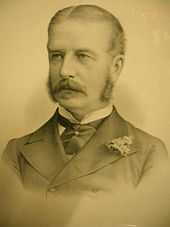Robert Vernon, 1st Baron Lyveden
| The Lord Lyveden GCB PC | |
|---|---|
| | |
| Secretary at War | |
| In office 6 February 1852 – 21 February 1852 | |
| Monarch | Victoria |
| Prime Minister | Lord John Russell |
| Preceded by | Hon. Fox Maule |
| Succeeded by | William Beresford |
| President of the Board of Control | |
| In office 3 March 1855 – 21 February 1858 | |
| Monarch | Victoria |
| Prime Minister | The Viscount Palmerston |
| Preceded by | Sir Charles Wood, Bt |
| Succeeded by | The Earl of Ellenborough |
| Personal details | |
| Born | 23 February 1800 |
| Died | 10 November 1873 |
| Nationality | British |
| Political party | Whig Liberal Party |
| Spouse(s) | Lady Emma Mary Fitzpatrick |
| Alma mater | Christ Church, Oxford |
Robert Vernon, 1st Baron Lyveden GCB PC (23 February 1800 – 10 November 1873), known as Robert Vernon Smith until 1859, was a British Liberal Party politician.
Background and education
Vernon was the son of Robert Percy Smith, of 20 Savile Row, London, and of Cheam, Surrey, and the nephew of The Rev. Sydney Smith, Canon of St Paul's. His mother was Carolina Maria Vernon, daughter of Richard Vernon. Vernon was educated at Christ Church, Oxford (2nd class classics 1822).
Political career
He was elected Member of Parliament for Tralee in 1829, a seat he held until 1831, and then sat for Northampton from 1831 to 1859. When the Whigs came to power in 1830 under Lord Grey, Vernon was appointed a Lord of the Treasury (government whip), which he remained also when Lord Melbourne became Prime Minister in July 1834. The Whigs fell from office in November of that year, but returned already in April 1835, when Vernon was appointed Secretary of the Board of Control by Melbourne, which he remained until 1839. He then served as Under-Secretary of State for the Colonies from 1839 to 1841. The latter year he was also admitted to the Privy Council. He did not hold office again until February 1852, when he was made Secretary at War in the first administration of Lord John Russell. However, the government fell already the same month. When the Liberals (as the Whigs were now known) returned to office in 1855 under Lord Palmerston, Vernon was appointed President of the Board of Control, with a seat in the cabinet, a post he retained until the government fell in March 1858. The following year he was raised to the peerage as Baron Lyveden, of Lyveden in the County of Northampton.,[1] and in 1879 he was appointed a Knight Grand Cross of the Order of the Bath (GCB).[2]
In 1845 he was appointed one of the Lay Commissioners in Lunacy.[3]
Family

Lord Lyveden married Lady Emma Mary Fitzpatrick, daughter and co-heir of the Earl of Upper Ossory, in 1823. In 1846 he assumed for his children by Royal license the surname of Vernon in lieu of Smith and in 1859 he assumed for himself by Royal license the same surname in lieu of Smith. Lord Lyveden died in November 1873, aged 73, and was succeeded in the barony by his son Fitzpatrick. Lord Lyveden was a member of the Reform Club, the Travellers Club, and Brooks's.
Notes
- ↑ The London Gazette: no. 22280. p. 2514. 28 June 1859.
- ↑ The London Gazette: no. 23876. p. 3190. 16 July 1872.
- ↑ Kathleen Jones (2003). Lunacy, law, and conscience, 1744-1845: the social history of the care of the insane. Routledge. p. 191. ISBN 0-415-17802-9.
References
- Kidd, Charles, Williamson, David (editors). Debrett's Peerage and Baronetage (1990 edition). New York: St Martin's Press, 1990,
- Leigh Rayment's Peerage Pages
External links
- Hansard 1803–2005: contributions in Parliament by Robert Vernon Smith
| Parliament of the United Kingdom | ||
|---|---|---|
| Preceded by Sir Edward Denny, Bt |
Member of Parliament for Tralee 1829–1831 |
Succeeded by Walker Ferrand |
| Preceded by Sir Robert Henry Gunning, Bt Sir George Robinson, Bt |
Member of Parliament for Northampton 1831–1859 With: Sir George Robinson, Bt to 1832 Charles Ross 1832–37 Raikes Currie 1837–57 Charles Gilpin from 1857 |
Succeeded by The Lord Henley Charles Gilpin |
| Political offices | ||
| Preceded by Henry Labouchere |
Under-Secretary of State for War and the Colonies 1839–1841 |
Succeeded by George William Hope |
| Preceded by Hon. Fox Maule |
Secretary at War 1852 |
Succeeded by William Beresford |
| Preceded by Sir Charles Wood, Bt |
President of the Board of Control 1855–1858 |
Succeeded by The Earl of Ellenborough |
| Peerage of the United Kingdom | ||
| New creation | Baron Lyveden 1859–1873 |
Succeeded by Fitzpatrick Henry Vernon |